De Nederlandse dichter en schrijver Simon Vinkenoog werd op 18 juli 1928 in Amsterdam geboren. Zie ook alle tags voor Simon Vinkenoog op dit blog.
Lastenia
Wat nog aan woorden
in mij wakker ligt
kan ik voor alle dag gebruiken
ik kan het bloed doen stollen
ik kan in andermans gedachten
wonen en er vruchten stelen
ik kan – als een hond geslagen –
huilen en ik kan spelend met vuur
mijzelf overwinnen
maar leven kan ik niet
het leven hangt buiten
het bereik van de klanken
zinnen en woorden
die ik als ledematen
lief heb gekregen
om een liefde die ik als zon
op het water heb zien schijnen
om een liefde die als licht
op mijn huid staat te branden
Photomaton
Zo’n foto is nooit weg,
en ze kosten maar vier voor een gulden
Kijk, het lijkt (na drie minuten)
en we staan er nog op, ook.
Omgekeerd natuurlijk, ik zat links
en op de foto’s zit ik rechts.
We zijn bruiner
dan in werkelijkheid,
en de schaafwond op mijn neus
blitst overdreven.
Links voorop, dat ben jij.
Ik kan nog niet zo goed wijs uit wat ik zie,
o.a. een blikkerbril met donker glas
en een baard met een snor boven regenjas.
We kijken voorop, jij bovendien opzij-
jij hebt de twee andere.
Ik lach, jij kijkt.
Zo’n foto is nooit weg, tenslotte
en wat is de moeilijkheid? Kleingeld,
ooghoogte, de keuze uit witte achtergrond
of donker gordijn. Kijken of het lijkt.
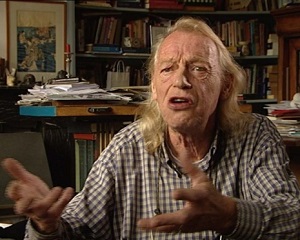
De Duitse dichter en schrijver Steffen Popp werd geboren op 18 juli 1978 in Greifswald. Zie ook alle tags voor Steffen Popp op dit blog.
Das Meer bewohnt mich, wie Licht eine Stadt
Die offenen Balkone leuchteten, Inseln am Stadtring
die Luft lag herum, eine Fähre, vermutlich schlief sie
ich legte meinen Kopf in ihren Rumpf
fand eine Strömung, das Regime der Flüsse
unter den Brücken und in den Tunneln
die Instrumente
Lichtketten, die sich bewegten.
Am Hafen
war ich allein mit dem Wasser, das dort an Land geht
Frachtkräne schienten den Kontinent
an seinen Rändern, im Hintergrund wirkten
die Meere.
Rede mit Toten
Zu wenig Mittel, alles zu denken, was geschieht
pflanzliches Schicksal z.B.: Im Tontopf verfault.
Das Intensive, gelangweilt von unseren Stilen
spuckt uns ins Licht, Humus für Geist, Mikroben.
Was ist, sagt das Kind, außer Erinnerung nicht
gegenwärtig im Raum, unausgespuckt in der Zeit
es lernt an diesem Tag die Wörter Nougat
Honduras, Zentralnervensystem, Zwerg Nase.
Es lernt das Wort Babel und vergisst es nicht
nur seinen Sinn, es lernt das Wort Hobel
das Wort Hobelspäne, das Wort Hobelbank.
Signifikant: das Schicksal des Hamsters z.B.
der Spinnen. Das Kind sagt hier nur -kant:
Legt wortgenau Gräber an. Redet so mit Toten.

De Noorse schrijver Per Petterson werd geboren in Oslo op 18 juli 1952. Zie ook alle tags voor Per Petterson op dit blog.
Uit: Paarden stelen (Vertaald door Marin Mars)
“Mijn vader was vuilnisman. Hij werkte op een vuilniswagen. Hij was de man die op de plank stond met de handschoenen aan en met de handschoenen rond de stang bij de opening aan de achterkant, … Mijn vader werd nooit een van de chauffeurs die hoog en droog in hun glimmende cabine zaten en nooit de moeite namen uit het raam te kijken als hij langs de weg zwoegde… […] Hij had een ongelooflijk sterk bovenlichaam… en dan was het toch vreemd dat hij niet zijn armen gebruikte, zijn vuisten, als hij ons ervan langs gaf Maar dat deed hij niet, hij gebruikte zijn benen, … hij gebruikte zijn laarzen. Hij trapte ons, hij trapte ons van achter op ons achterste, en het deed soms zo vreselijk pijn….”
(…)
“En toen kwam het leven op zijn kop te staan van de jongen die alleen achterbleef met pijnlijk lege handen wat een mannelijk voorbeeld betreft, een voetballende man, een langlaufende man die zijn benen zelfverzekerd tussen de benen van andere mannen plantte, die nooit naar de grond staarde, maar iedereen om hem heen vrijmoedig aankeek. En nu was deze man dood of verdwenen en al een legende die moeilijk was te evenaren. En toch bevond die man zich in een of andere vorm ergens in jezelf …. Maar in Jim had zich niets afgezet, niets wat je op een röntgenfoto zou kunnen zien, van binnen was alles zoals het altijd was geweest, en een dergelijk vader of wat voor andere vader dan ook had hij nooit gehad..”
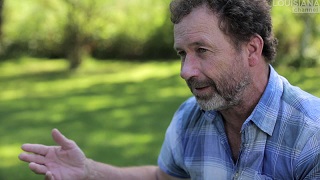
De Amerikaanse schrijfster en essayiste Elizabeth M. Gilbert werd geboren op 18 juli 1969 in Waterbury, Connecticut. Zie ook alle tags voor Elizabeth Gilbert op dit blog.
Uit: Committed
“Late one afternoon in the summer of 2006, I found myself in a small village in northern Vietnam, sitting around a sooty kitchen fire with a number of local women whose language I did not speak, trying to ask them questions about marriage.
For several months already, I had been traveling across Southeast Asia with a man who was soon to become my husband. I suppose the conventional term for such an individual would be “fiancé,” but neither one of us was very comfortable with that word, so we weren’t using it. In fact, neither one of us was very comfortable with this whole idea of matrimony at all. Marriage was not something we had ever planned with each other, nor was it something either of us wanted. Yet providence had interfered with our plans, which was why we were now wandering haphazardly across Vietnam, Thailand, Laos, Cambodia, and Indonesia, all the while making urgent—even desperate—efforts to return to America and wed.
The man in question had been my lover, my sweetheart, for over two years by then, and in these pages I shall call him Felipe. Felipe is a kind, affectionate Brazilian gentleman, seventeen years my senior, whom I’d met on another journey (an actual planned journey) that I’d taken around the world a few years earlier in an effort to mend a severely broken heart. Near the end of those travels, I’d encountered Felipe, who had been living quietly and alone in Bali for years, nursing his own broken heart. What had followed was attraction, then a slow courtship, and then, much to our mutual wonderment, love.”

De Argentijnse schrijfster en vertaalster Alicia Steimberg werd geboren op 18 juli 1933 in Buenos Aires. Zie ook alle tags voor Alicia Steinberg op dit blog.
Uit: Call Me Magdalena
“Tastefully attired in a lime-green sundress and sandals, with a touch of Femme behind each earlobe, I sat down on the bed to read an old Ellery Queen novel I had found in one of the dresser drawers while I waited for Enrique to finish showering and dressing. I could feel the fresh evening breeze through the open window. I felt expansively happy at being in the country.
A half hour later, Enrique and I got together with the other guests and the owners of the house in the large parlor on the first floor. The parlor floor was also made of black-and-white mosaic tiles, rhomboid. There was a marble fireplace, where logs probably crackled in winter. Everyone was settled in chairs around a low table covered with glasses, bottles, and trays of hors d’oeuvres. In one corner of the parlor there was a baby grand piano, on which a child of Eusebio’s—the man who had driven us there—practiced a silly tune, making mistakes with practically every note. Vexed, I looked at him, wondering how we would endure the next few days at the estancia with so many little kids, because in addition to Eusebio’s two, there were Juan Antonio’s and Emi’s children, Gustavo’s baby, and two other children who were friends of Juan Antonio’s kids. I hadn’t brought any along myself. My adolescents preferred to stay in Buenos Aires with their grandmother, devoting themselves to their noisy pursuits. I must confess I have no fondness for small children, especially if they aren’t mine, and I had entertained fantasies of spending some peaceful days at Las Lilas, without squalling or spilled drinks or parents shouting at kids who had climbed up to some great height and threatened to fall into an abyss.“
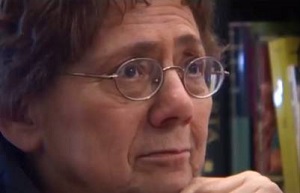
De Russische dichter Jevgeny Jevtoesjenko werd geboren in Zima in Irkutsk op 18 juli 1933. Zie ook alle tags voor Jevgeni Jevtoesjenko op dit blog en ook mijn blog van 18 juli 2010.
Babi Yar (Fragment)
No monument stands over Babi Yar.
A steep cliff only, like the rudest headstone.
I am afraid.
Today, I am as old
As the entire Jewish race itself.
I see myself an ancient Israelite.
I wander o’er the roads of ancient Egypt
And here, upon the cross, I perish, tortured
And even now, I bear the marks of nails.
It seems to me that Dreyfus is myself.
The Philistines betrayed me – and now judge.
I’m in a cage. Surrounded and trapped,
I’m persecuted, spat on, slandered, and
The dainty dollies in their Brussels frills
Squeal, as they stab umbrellas at my face.
I see myself a boy in Belostok
Blood spills, and runs upon the floors,
The chiefs of bar and pub rage unimpeded
And reek of vodka and of onion, half and half.
I’m thrown back by a boot, I have no strength left,
In vain I beg the rabble of pogrom,
To jeers of “Kill the Jews, and save our Russia!”
My mother’s being beaten by a clerk.
Vertaald door Benjamin Okopnik
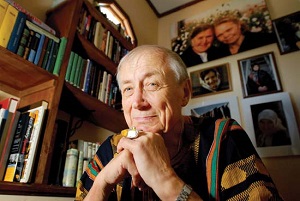
De Nederlandse schrijver, criticus en politicus Aad Nuis werd geboren op 18 juli 1933 in Sliedrecht. Zie ook alle tags voor Aad Nuis op dit blog en ook mijn blog van 18 juli 2010.
Twistgesprek
Een man?
Een veiligheidsspeld van een man.
Een rotventje.
Och nee, och nee, roerdompte iemand,
Daar komt ten slotte de atoombom van
Als je al zo begint –
En ging weer langzaam zitten.
De stilte was een hooiberg, en natuurlijk
Wie viel daar anders binnen dan
Die man?
De spanning broeide.
Contact! Tik, stoot en tegenstoot,
Wij beiden vielen moedig dood.
Ach nee, ach nee,
En ging weer langzaam zitten.
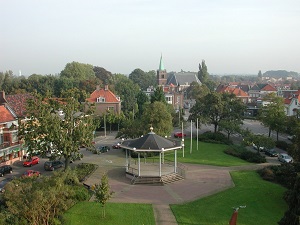
Sliedrecht
De Engelse schrijver William Makepeace Thackeray werd geboren in Calcutta op 18 juli 1811. Zie ook alle tags voor William Makepeace Thackeray op dit blog en mijn blog van 18 juli 2010.
Uit: Vanity Fair
“Although schoolmistresses’ letters are to be trusted no more nor less than churchyard epitaphs; yet, as it sometimes happens that a person departs this life, who is really deserving of all the praises the stone-cutter carves over his bones; who is a good Christian, a good parent, child, wife, or husband; who actually does leave a disconsolate family to mourn his loss; so in academies of the male and female sex it occurs every now and then, that the pupil is fully worthy of the praises bestowed by the disinterested instructor. Now, Miss Amelia Sedley was a young lady of this singular species; and deserved not only all that Miss Pinkerton said in her praise, but had many charming qualities which that pompous old Minerva of a woman could not see, from the differences of rank and age between her pupil and herself.
For she could not only sing like a lark, or a Mrs. Billington, and dance like Hillisberg or Parisot; and embroider beautifully; and spell as well as a Dixonary itself; but she had such a kindly, smiling, tender, gentle, generous heart of her own, as won the love of everybody who came near her, from Minerva herself down to the poor girl in the scullery, and the one-eyed tart-woman’s daughter, who was permitted to vend her wares once a week to the young ladies in the Mall. She had twelve intimate and bosom friends out of the twenty-four young ladies. Even envious Miss Briggs never spoke ill of her, high and mighty Miss Saltire (Lord Dexter’s granddaughter) allowed that her figure was genteel; and as for Miss Swartz, the rich woolly-haired mulatto from St. Kitt’s, on the day Amelia went away, she was in such a passion of tears, that they were obliged to send for Dr. Floss, and half tipsify her with salvolatile.”
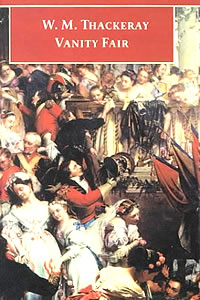
Cover
De Franse schrijfster Nathalie Sarraute werd geboren op 18 juli 1900 in Ivanova, Rusland. Zie ook alle tags voor Nathalie Sarraute op dit blog en mijn blog van 18 juli 2010.
Uit: Tropismes
« Par les journées de juillet très chaudes, le mur d’en face jetait sur la petite cour humide une lumière éclatante et dure.
Il y avait un grand vide sous cette chaleur, un silence, tout semblait en suspens ; on entendait seulement, agressif, strident, le grincement d’une chaise traînée sur le carreau, le claquement d’une porte. C’était dans cette chaleur, dans ce silence – un froid soudain, un déchirement.
Et elle restait sans bouger sur le bord de son lit, occupant le plus petit espace possible, tendue, comme attendant que quelque chose éclate, s’abatte sur elle dans ce silence menaçant.
Quelquefois le cri aigu des cigales, dans la prairie pétrifiée sous le soleil et comme morte, provoque cette sensation de froid, de solitude, d’abandon dans un univers hostile où quelque chose d’angoissant se prépare.
Etendu dans l’herbe sous le soleil torride, on reste sans bouger, on épie, on attend.
Elle entendait dans le silence, pénétrant jusqu’à elle le long des vieux papiers à raies bleues du couloir, le long des peintures sales, le petit bruit que faisait la clef dans la serrure de la porte d’entrée. Elle entendait se fermer la porte du bureau.
Elle restait là, toujours recroquevillée, attendant, sans rien faire. La moindre action, comme d’aller dans la salle de bains se laver les mains, faire couler l’eau du robinet, paraissait une provocation, un saut brusque dans le vide, un acte plein d’audace. Ce bruit soudain de l’eau dans ce silence suspendu, ce serait comme un signal, comme un appel vers eux, ce serait comme un contact horrible, comme de toucher avec la pointe d’une baguette une méduse et puis d’attendre avec dégoût qu’elle tressaille tout à coup, se soulève et se replie.”
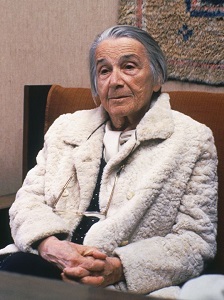
Zie voor nog meer schrijvers van de 18e juli ook mijn blog van 18 juli 2015 deel 2.
